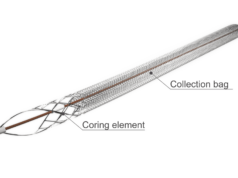
Inari Medical have announced the presentation of results from its FlowTriever Pulmonary Embolectomy (FLARE) clinical study that evaluated the safety and effectiveness of the FlowTriever Retrieval/Aspiration System for the treatment of pulmonary embolism. The results were presented by Thomas Tu, an interventional cardiologist at Baptist Health, Louisville, Kentucky, during the Scientific Sessions of the Society for Cardiovascular Angiography and Interventions (SCAI; 25–28 April) held in San Diego, USA.
The FLARE study is a prospective, multicentre, single-arm study evaluating the FlowTriever System in 106 patients with acute PE at 18 sites in the USA. Patients with proximal pulmonary embolism and right heart strain (RV/LV ratio ≥0.9) were eligible to participate. Treatment with the FlowTriever System was used to mechanically remove blood clots in the pulmonary arteries.
The mean RV/LV ratio in the study decreased from a baseline 1.53 to 1.15 at 48 hours post-procedure, a difference of 0.39 (p<0.0001). The study also demonstrated excellent safety at 30 days, with a low 3.8% rate of major adverse events and no device related complications. Median intensive care unit stay was one day and overall median length of hospital stay was three days.
“The significant improvement in right heart function shown with the FlowTriever System compares very favorably with outcomes of other techniques used to treat pulmonary embolism,” said Tu. “At the same time, the impressive safety profile reflects the advantages of FlowTriever’s purely mechanical approach which avoids the use of thrombolytic drugs and resulting risk of bleeding complications.”
“The results of the FLARE study mark an exciting advancement in the treatment of acute pulmonary embolism patients,” stated Victor Tapson, associate director of the Pulmonary and Critical Care Division at Cedars-Sinai Medical Center in Los Angeles, USA, and co-principal investigator of the study. “Until now, there has not been an approach to rapidly restore flow to reverse right heart strain without the use of thrombolytic drugs and their inherent risk of bleeding complications.”
The FlowTriever System represents a breakthrough in treatment options for this large patient population,” added Ken Rosenfield, section head for Vascular Medicine and Intervention at Massachusetts General Hospital and co-principal investigator of the study. “These results indicate that mechanical thrombectomy with the FlowTriever System will play an increasing role in the management of pulmonary embolism.”









